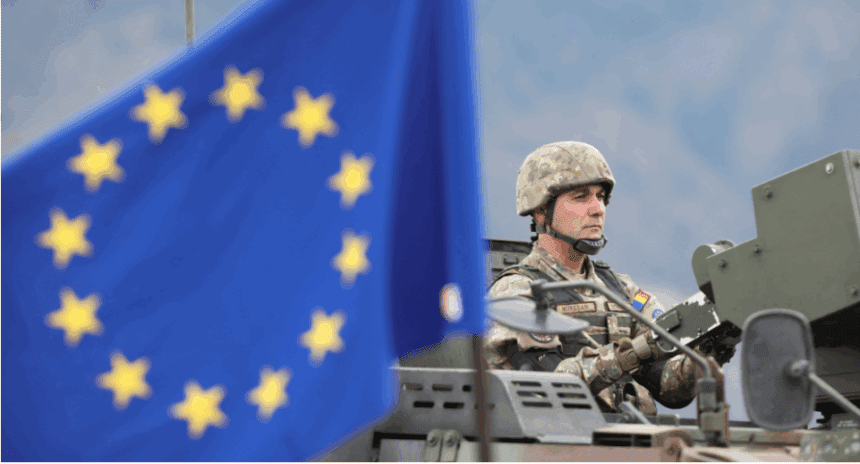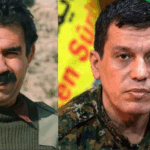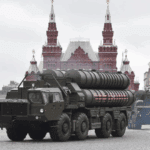Turkey has signalled it is ready to reopen one of its most sensitive disputes with Greece – the breadth of territorial waters in the Aegean – as it pushes for greater access for its defence industry to the EU’s new €150 billion SAFE military loans scheme. Ankara’s permanent delegation to the EU told Euractiv that Türkiye is “ready and willing” to discuss “interconnected Aegean issues” with Athens, including the breadth of the territorial sea, which is currently six nautical miles for both countries. Behind the diplomatic language lies an implicit trade-off: Greece and Cyprus are blocking Turkey’s attempt to upgrade its participation in SAFE, and Ankara is hinting that the Aegean and EU defence industrial policy now belong to the same bargaining space.
SAFE (Security Action for Europe) is the EU’s new instrument allowing member states to borrow on favourable terms to jointly procure weapons and invest in Europe’s defence industrial base. While the loans go to EU countries, who supplies the hardware is crucial. Under the rules, at least 65 percent of a project’s component value must be produced in the EU, Norway or Ukraine, and third-country firms are normally capped at 35 percent of the component value. Turkey, which has developed a large NATO-interoperable defence sector producing drones, armoured vehicles, artillery and naval systems, wants that 35 percent ceiling raised for Turkish manufacturers so they can play a much larger role in SAFE-funded contracts. Ankara formally applied in June to be treated more like “privileged” partners such as the UK, which is negotiating enhanced access.
Greece and Cyprus have moved in tandem to block this bid. Athens frames its objection in political and legal terms. It argues that the EU cannot deepen defence dependence on a country that still maintains a formal threat of war – the 1995 casus belli – against an EU member state over the possible extension of territorial waters in the Aegean. Under the UN Convention on the Law of the Sea (UNCLOS), coastal states can claim up to 12 nautical miles of territorial sea, and Greece, which has ratified UNCLOS, says it has the right to do so. Turkey, which has not signed UNCLOS, argues the Aegean’s geography is special and insists that a move from six to twelve nautical miles would be unacceptable, having labelled such a step a cause for war. For Athens, it is contradictory for the EU to rely on a state that keeps this threat on the books while simultaneously seeking privileged access to EU defence money.
Nicosia’s position is even starker. Cyprus, whose northern third has been under Turkish military control since 1974, maintains that a state which occupies EU territory and does not recognise the Republic of Cyprus cannot at the same time benefit from an EU defence programme. President Nikos Christodoulides has said the EU effectively adopted Cyprus’ line that Turkey must first meet political conditions before any discussion of SAFE participation becomes realistic. Cypriot officials also worry about loopholes that might allow Turkish entities indirect access to the scheme and demand that these be firmly closed.
Turkey pushes back hard against these arguments. On the Aegean casus belli, Ankara says Greece has “misconceptualised” the threat and stresses that Turkey is now prepared to put all interconnected Aegean issues, including the breadth of territorial seas, on the table. The message is that if Greece wants reassurance on the war threat and maritime disputes, it should also be open to reconsidering its opposition to Turkish involvement in SAFE. On Cyprus, the Turkish mission insists that what Greek Cypriots describe as a threat is, in Ankara’s view, Turkey’s effective guarantee of the security and well-being of Turkish Cypriots against alleged plans to Hellenise the island. Turkey portrays itself not as an aggressor but as a protecting power, a narrative rejected by Nicosia and the EU but central to Ankara’s justification for its military presence. Turkish officials also urge the European Commission and member states to focus on mutual interests rather than “political prejudice,” arguing that excluding a major NATO ally’s industry from SAFE ultimately undermines Europe’s own defence capacity.
Formally, decisions on defence-industrial instruments like SAFE are taken by qualified majority, which means Greece and Cyprus do not possess a legal veto. In practice, however, EU capitals tend to seek political consensus on hard security matters, which gives Athens and Nicosia significant leverage. At the same time, the EU faces intense pressure to ramp up weapons production in the wake of Russia’s full-scale invasion of Ukraine and to build more autonomous defence capabilities amid concerns about US reliability. In that context, Turkey’s defence industry appears both useful and controversial. It is useful because Turkish systems are relatively cheap, combat-tested and largely interoperable with NATO standards. It is controversial because several member states see deeper dependence on Turkey as strategically risky in light of unresolved disputes over the Aegean, Cyprus, Libya and Eastern Mediterranean energy.
The negotiations with other third countries show how unusual the Turkish case is. The UK and Canada have also applied for better access to SAFE, but their talks with the EU are blocked primarily over the size of the financial “entry ticket” they would need to pay in return for enhanced access. The friction there is commercial rather than geopolitical. Neither London nor Ottawa is accused of occupying EU territory or maintaining a formal war threat against a member state, which underlines how distinct the Greek–Cypriot objections to Ankara are.
What happens next will depend on several interlocking factors. One is whether Turkey is prepared to substantially soften or even formally revise its 1995 casus belli regarding the Aegean, which could shift the mood in some EU capitals even if Greek domestic politics make concessions difficult. Another is whether heavyweights such as Germany can broker a formula that acknowledges Greek and Cypriot security concerns while allowing limited, carefully framed participation by Turkish industry where it directly serves EU and NATO interests. A third question is whether the European Commission ultimately chooses to treat SAFE as a purely industrial instrument or continues to allow bilateral disputes to condition access in practice.
For now, Ankara is sending a clear signal that if the EU wants to treat Turkey as a serious defence-industrial partner, it must also be prepared to engage with long-running dossiers on the Aegean and Cyprus. Greece and Cyprus, in response, are making it equally clear that no amount of industrial logic or short-term defence needs will trump what they see as fundamental questions of sovereignty, security and international law



